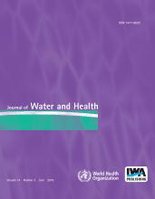
JOURNAL OF WATER AND HEALTH
Scope & Guideline
Advancing global health through innovative water research.
Introduction
Aims and Scopes
- Water Quality Assessment:
Research related to the evaluation of water quality across various sources, including groundwater, surface water, and treated water, focusing on physicochemical and microbiological parameters. - Microbial Pathogens and Waterborne Diseases:
Investigation of microbial pathogens in water bodies and their implications for public health, including studies on waterborne diseases and methods for pathogen detection. - Antimicrobial Resistance in Water Systems:
Exploration of the presence and impact of antibiotic-resistant bacteria in water systems, including wastewater treatment facilities and natural water bodies. - Public Health Implications of Water Quality:
Research that connects water quality issues with public health outcomes, including studies on the health risks associated with contaminated water sources. - Innovative Water Treatment Technologies:
Development and evaluation of new technologies and methodologies for improving water treatment and ensuring safe drinking water. - Environmental Surveillance and Epidemiology:
Utilization of environmental data, including wastewater surveillance, to track public health trends and outbreaks, particularly in relation to infectious diseases. - Climate Change and Water Security:
Studies examining the impacts of climate change on water quality and availability, and how these changes affect public health and water management practices. - Water Governance and Policy:
Research that addresses the socio-political aspects of water management, including governance structures, policy frameworks, and community engagement.
Trending and Emerging
- Wastewater-Based Epidemiology:
There is a growing emphasis on using wastewater surveillance to monitor public health, particularly in relation to viral outbreaks such as COVID-19, indicating its potential as a public health tool. - Impact of Climate Change on Water Security:
Research is increasingly focusing on the effects of climate change on water quality and availability, underscoring the need for adaptive management strategies. - Health Risk Assessment of Water Contaminants:
A trend towards detailed health risk assessments of various water contaminants, including heavy metals and pathogens, is emerging, reflecting a more nuanced understanding of public health risks. - Microbial Resistance and Pathogen Evolution:
Studies exploring the evolution of microbial resistance in aquatic environments are on the rise, highlighting concerns about the implications for public health and treatment efficacy. - Community Engagement in Water Management:
Emerging research emphasizes the importance of community involvement and local knowledge in water management practices, suggesting a shift towards more participatory governance. - Integrated Water Resource Management (IWRM):
There is an increasing focus on IWRM approaches that consider the interconnections between water, health, and environmental sustainability. - Technological Innovations in Water Treatment:
Research into new and innovative water treatment technologies, such as nanotechnology and advanced filtration methods, is gaining traction as solutions to improve water quality. - Behavioral Studies on Water Use Practices:
Emerging themes include the examination of social and behavioral factors influencing water use and sanitation practices, particularly in low-resource settings.
Declining or Waning
- Traditional Water Treatment Methods:
There seems to be a decreasing emphasis on conventional water treatment methods, as newer technologies and approaches gain traction in the field. - Basic Water Quality Monitoring:
Research focusing solely on basic water quality parameters without integrating more complex analyses or health implications appears to be waning. - Historical Epidemiological Studies:
The trend shows a decline in studies that focus on historical data analysis of waterborne diseases, as the field shifts towards real-time monitoring and predictive analytics. - Non-Microbial Water Contaminants:
There is a noticeable reduction in the focus on non-microbial contaminants (e.g., chemical pollutants) in water studies, possibly overshadowed by the pressing issues of microbial safety. - General Awareness Campaigns:
Research centered around generic public awareness campaigns regarding water safety without specific evidence-based interventions is becoming less common.
Similar Journals
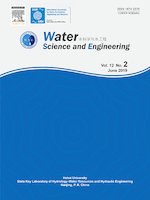
Water Science and Engineering
Advancing Knowledge in Water Science and EngineeringWater Science and Engineering, published by ELSEVIER, is a premier open access journal that has been disseminating vital research in the realms of civil and structural engineering as well as ocean engineering since 2008. With its ISSN 1674-2370 and E-ISSN 2405-8106, this journal plays a crucial role in advancing knowledge and innovation within the sector, evidenced by its impressive rankings in Scopus—holding the 15th position out of 105 in Ocean Engineering and 76th out of 379 in Civil and Structural Engineering, placing it in the 86th and 80th percentiles, respectively. Attaining a Q1 classification in both categories for 2023 highlights its importance and influence in the academic and professional communities. The journal addresses a broad spectrum of topics integral to water sciences, offering significant insights for researchers, professionals, and students alike. With a convergence period spanning from 2010 to 2024, it continues to explore contemporary issues and advancements, providing a pivotal platform for the dissemination of research. The journal is accessible to a global audience, reaffirming its commitment to fostering open access and enhancing accessibility to vital scientific literature.
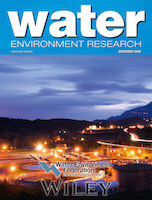
WATER ENVIRONMENT RESEARCH
Bridging research and practice for a healthier water ecosystem.WATER ENVIRONMENT RESEARCH is a leading scholarly journal dedicated to disseminating cutting-edge research in the fields of water science and technology. Published by WILEY, this esteemed journal (ISSN: 1061-4303; E-ISSN: 1554-7531) is renowned for its rigorous peer-reviewed articles that explore critical issues related to ecological modeling, environmental chemistry, pollution, and waste management. Established in 1992 and continuing through 2024, WATER ENVIRONMENT RESEARCH has secured a notable position within its category quartiles, ranking in the Q2 tier for several disciplines, including ecological modeling and water science and technology. It is highly regarded in the Scopus database, holding a rank of #53 out of 261 journals in Environmental Science related to Water Science and Technology, positioning it in the 79th percentile. As it continues to bridge research and practice, this journal serves as an essential resource for researchers, professionals, and students striving to advance knowledge and foster sustainable solutions within the water environment sector.

Journal AWWA
Empowering Researchers and Professionals to Tackle Water Quality Issues.Journal AWWA, published by WILEY, serves as a vital platform in the fields of Chemistry and Water Science and Technology. Established in 1946 and with a rich history extending to 2024, this journal is dedicated to the dissemination of innovative research and practical insights that address the pressing challenges associated with water quality and management. Although currently not an open-access publication, it provides important contributions to a diverse audience, including researchers, industry professionals, and students dedicated to advancing knowledge in water sciences. With a respectable Q3 ranking in both the Chemistry and Water Science categories, as well as competitive Scopus rankings, Journal AWWA consistently delivers peer-reviewed articles that foster critical discussions and promote sustainable solutions within the community. The journal's commitment to excellence ensures that it remains a significant resource for those engaged in environmental science and technology.
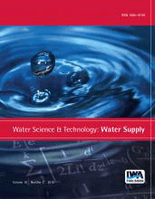
Water Supply
Elevating the discourse on water resources.Water Supply is an esteemed journal published by IWA PUBLISHING that plays a pivotal role in the field of water science and technology. With an ISSN of 1606-9749 and an E-ISSN of 1607-0798, this journal has been a key resource for researchers and professionals since its inception in 2001. Now covering a wide range of topics until 2024, it is recognized for its impactful contributions, holding a Q2 ranking in the Environmental Science: Water Science and Technology category, and currently stands at rank #125 out of 261 in Scopus, reflecting its relevance and influence in the academic community. The journal aims to disseminate significant research findings and innovations in water supply management, ensuring that professionals and students are equipped with the latest knowledge and practices in the sector. Despite not being an open-access journal, Water Supply continues to attract high-quality submissions that enhance our understanding and preservation of vital water resources. For those invested in sustainable water practices, this journal is an invaluable tool for continued learning and advancement.
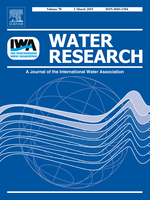
WATER RESEARCH
Cultivating a deeper understanding of our most vital resource.WATER RESEARCH, published by Pergamon-Elsevier Science Ltd, is a premier international journal dedicated to the advancement of knowledge in the interdisciplinary field of water science and technology. With a significant impact factor, WATER RESEARCH holds a distinguished position, consistently ranking in the top quartile (Q1) across multiple categories including Civil and Structural Engineering, Environmental Engineering, and Pollution. Established in 1967 and set to continue its legacy until at least 2024, this journal provides a vital platform for researchers and professionals to disseminate cutting-edge findings related to water sustainability, quality, and management. Although the journal follows a traditional access model, its commitment to disseminating impactful research ensures that it remains an essential resource for academia and industry alike. With a rigorous selection process, the journal includes articles that significantly contribute to the understanding and resolution of global water-related challenges, making it an invaluable asset for researchers, students, and practitioners engaged in this critical area of study.
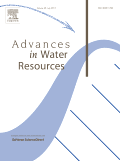
ADVANCES IN WATER RESOURCES
Elevating the discourse on critical water issues.ADVANCES IN WATER RESOURCES is a premier peer-reviewed journal published by Elsevier Science Ltd, dedicated to advancing the field of water science and technology since its inception in 1977. With an impressive Q1 ranking in the field, this journal provides a vital platform for researchers, professionals, and students to disseminate cutting-edge research that addresses critical issues related to water resources management, hydrology, and environmental sustainability. The journal offers a comprehensive collection of articles that explore innovative methodologies, policy implications, and case studies that shape the future of water resource management. Although it does not provide open access, its impactful contributions are recognized globally, making it an essential resource for anyone engaged in water science. The journal continues to publish relevant research while looking forward to bridging the gap between theoretical insights and practical applications up until 2024.

Water Research X
Leading the charge in water science innovation.Water Research X is a prestigious journal published by ELSEVIER, focusing on the dynamic fields of water science and technology, pollution, ecological modeling, and waste management. Since its inception in 2018, this Open Access journal has become a cornerstone resource for researchers and professionals dedicated to advancing our understanding and management of water resources. Based in the United Kingdom, Water Research X holds an impressive ranking within the Scopus metrics, positioned in the Q1 category across multiple relevant disciplines, including Environmental Science, with a notable rank of 10/261 in Water Science and Technology and 3/41 in Ecological Modeling. This reflects its commitment to disseminating high-quality research that informs policy, supports sustainable practices, and fosters innovation in water management.

Water Resources and Irrigation Management-WRIM
Empowering Research for Agricultural SustainabilityWater Resources and Irrigation Management (WRIM), published by Universidade Federal do Recôncavo da Bahia, is a vital academic journal focused on the essential fields of water resources and irrigation practices. With an ISSN of 2316-6886, this journal aims to disseminate high-quality research that addresses the challenges of sustainable water management in agricultural settings, particularly in the unique contexts of Brazil and similar ecosystems. The journal emphasizes rigorous empirical studies, innovative approaches, and policy implications, positioning itself as a key resource for researchers, practitioners, and students engaged in water resource management and agricultural sustainability. Although currently not available as Open Access, WRIM is dedicated to advancing knowledge in this critical area, encouraging collaboration and discourse among professionals passionate about optimizing irrigation systems and environmental stewardship.
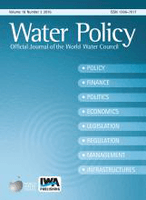
Water Policy
Bridging the gap between research and real-world water solutions.Water Policy is a leading academic journal published by IWA PUBLISHING, dedicated to advancing the understanding of water management and policy across various disciplines. With a focus on the intricacies of water governance, the journal fosters dialogue among researchers and practitioners by presenting innovative studies and comprehensive analyses. Since transitioning to an Open Access model in 2021, it has increased accessibility to critical research, allowing for a broader reach and greater impact within the water sector. The journal's reputation is underscored by its classification in Q2 and Q3 quartiles in fields such as Geography, Planning and Development, as well as Environmental Science disciplines, marking it as a valuable resource for scholars and policymakers alike. The ISSN 1366-7017 and E-ISSN 1996-9759 facilitate streamlined access to its extensive archive, encouraging wider engagement in pivotal discussions surrounding sustainable water practices. With a commitment to shaping the future of water governance, Water Policy stands as an essential platform for sharing vital research and perspectives that contribute to effective water management globally.
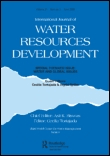
INTERNATIONAL JOURNAL OF WATER RESOURCES DEVELOPMENT
Advancing sustainable solutions for global water challenges.The INTERNATIONAL JOURNAL OF WATER RESOURCES DEVELOPMENT, published by ROUTLEDGE JOURNALS, TAYLOR & FRANCIS LTD, stands as a premier platform for disseminating cutting-edge research in the fields of water resources management and sustainable development. With an impressive impact factor indicated by its Q1 ranking in both Development and Water Science and Technology categories, this journal is pivotal for researchers and professionals seeking to advance their understanding of water-related challenges and solutions. Covering a broad spectrum of topics, it features contributions from leading experts, making it an essential resource for both academic inquiry and practical application. Although it does not currently offer Open Access, the journal's rigorous peer-review process ensures high-quality scholarship from 1983 to the present, reinforcing its role in shaping policies and practices globally. The journal is indexed in Scopus with notable rankings in Social Sciences and Environmental Science, highlighting its influence and reach within these vital sectors.